Thank You
Statewide Council recognizes business contributions with awards dinner
Lexington -The Department
of Vocational Rehabilitation has to rely on a strong trust between itself
and
Kentucky businesses. Never is that more evident than at the Statewide
Council for Vocational Rehabilitation's
(SCVR) annual employer recognition dinner. More than 100 guests, made
up of employers, Statewide Council
members and vocational rehabilitation staff, gathered at the Marriott
Griffin Gate Resort in Lexington on
Sunday, October 13 to honor the business community. A community that
is vital to consumers according to
Pam Hancock, chairperson of the SCVR.
“Employers play an
intricate role in the public VR Program,” Hancock said. “People
who work live longer, are
more productive, and lead happier lives and, without employers, the
quality of life for people with disabilities
would be diminished.”
Commissioner Bruce Crump
handed out the awards. Mindy Yates, Sherri Greer and Barry Newill shared
the
role of moderating the event. Employers are recognized each year for
their success in hiring and working with
individuals with disabilities. A list of employers receiving awards
follows:
Bay West, Cambridge Place,
CINTAS – The Uniform People, Community Trust Bank, Kentucky Department
for Health Services Division of Mental Retardation, GAP, Inc., Jones
Plastics & Engineering Corp., Kincaid
Electric, Lake Cumberland Regional Hospital, McHale’s Catering
& Event Specialists, Paducah Housing
Authority, Morris Tool & Plastics, Murty Pharmaceutical, Southeastern
KY Rehabilitation Industries, Tennessee
Wire Technologies, UPS e-Logistics, Wal-mart.
Turning Heads with
“Extreme Makeovers”
Bowling Green job placement team try exciting new approach to help consumers
Bowling Green - On Monday,
November 10, the Bowling Green Job Placement Team held their first “Extreme
Makeover”. When a person is job hunting it can be confidence draining
for anyone, especially our consumers
who already have enough challenges and barriers placed before them.
This was a special treat designed for
female participants who attend Job Search weekly.
“The purpose of our
event was to help improve each consumer’s self-confidence so that
they could be more
effective during interviews,” says Employment Specialist Missy
Wheeler. Each participant was mailed an
“invitation” to attend. Several of the DVR staff modeled
varying types of attire to give the consumers a visual
lesson on “How to Dress for Various Types of Interviews.”
The group also invited two
licensed cosmetologists, one of which is a consumer and Job Search participant,
along with Ms. Jule Argueta, owner and operator of MAD Fashions and
a licensed cosmetologist who
provided the opportunity for each attendee to get a trim on their existing
hair style or for the daring ones, a
whole new look.
The ladies received tips
on accentuating foundation, lip and eye colors and how to apply the
makeup for a
professional interviewing look. Some of the results were astonishing,
but all of the participants left with a
“new attitude”. In addition, Ms. Arguetta graciously donated
an interview outfit to each female participant who
was interested.
So that everyone in Job Search
could be included in the festivities, Jerry Farias, with the local DES
office,
attended a Job Search class and gave some pointers on what the actual
job market looks like and what
employers are looking for in a job candidate.
Farias, who has been designated
at the DES office to work exclusively with DVR consumers, was extremely
informative and gave consumers several job leads during class.
“We are looking forward
to developing a strong working relationship with Mr. Farias and anticipate
great
things to transpire from our combined efforts,” Wheeler said.
April Lee, Penney Baseheart
and Missy Wheeler make up the Job Placement Team in Bowling Green and
were responsible for putting on the event.
CDPCRC offers new direction with COMPASS
The Carl D. Perkins Comprehensive
Rehabilitation Center's evaluation unit may now administer the
COMPASS (computerized adaptive testing system) to DVR consumers. The
COMPASS is the placement
test used for admission into the community and technical college system.
The Tests of Adult Basic Education
(TABE) will continue to be the test of choice for the evaluation unit;
however, the COMPASS will be used
if it is know that a community and technical college program is being
considered.
CDPCRC Unit Director Doug
Wireman had this to say about the new endeavor. “We were very
pleased to
get this pilot going with ACT and the community technical college system.
We want to thank Charles Puckett
for the role that he played in helping getting this accomplished.”
After delay, state to begin at-home care service
By BONNA de la CRUZ
Staff Writer
The Tennessean
For three hours a week, a
homemaker assistant stops by Marvin Berry's campus apartment and changes
bed linens, washes clothes and vacuums.
With the assistance, along
with help from a vocational rehabilitation aide, Berry, 31, is able
to live the life he
leads: a full load of classes at Austin Peay State University in Clarksville,
pledging a business fraternity,
loyally following the Titans and University of Tennessee football teams.
The junior in business is
paralyzed from the neck down. That puts him among thousands of Tennesseans
who need a variety of help at home, from washing dishes to bathing,
to get by, or else they would end up in a
nursing home.
Tennessee is embarking on
different paths to start filling the gap in home-based services for
seniors and
disabled Tennesseans with long-term needs.
Starting next month, a long-awaited
TennCare program will begin offering home-care services to almost
3,000 elderly and disabled people in East Tennessee, Nashville and Memphis.
It would be the state's largest effort to offer alternatives to nursing home care and the first statewide.
The $29 million program,
for now simply dubbed ''Statewide 1915'' after its federal designation,
is expected
to give 2,871 disabled and elderly people options other than nursing
homes. Linking individuals with seven
types of home-based services, it is expected to be available statewide
by March. It was budgeted three years
ago under former Gov. Don Sundquist, but the program never started.
It was stymied by difficulty building up
a network of providers, and that left the money available for state
officials to raid to offset budget deficits.
TennCare is now in the planning
stages of another effort, a pilot program in the Nashville area as part
of a
court settlement between TennCare and some enrollees. It could go statewide
in two years.
TennCare Director Manny Martins
says he envisions a program that would be run by managed-care
organizations under a ''continuum of care'' approach.
This approach would combine
a person's medical health and long-term care needs under one system
and could serve as a model for long-term care reform, said Brian McGuire,
legislative director here for
AARP, a nonprofit organization for people 50 and older. AARP and other
advocates would like to see
TennCare's approach to care for elderly and disabled people move away
from nursing homes toward
more home- and community-based care, he said. Tennessee ranks last in
the nation in the amount of federal
Medicaid dollars earmarked for home- and community-based services.
''Some just need one or two
services to stay at home,'' McGuire said. ''It's cheaper overall and
serves more
people.''
It will take about a year to get the pilot off the ground, Martins said.
It's not clear how the two programs could work together down the road, McGuire said.
Under both programs, services
could not exceed the $120-a-day average Medicaid pays for nursing
home care.
Home-based care is generally
cheaper, said Charles Hewgley, assistant director for the Tennessee
Commission on Aging and Disability. He estimates costs per person in
Statewide 1915 at $8,500 a year,
compared with $28,000 a year in a nursing home. To get state help now,
Tennesseans wait to get on three
small programs run by TennCare that assist more than 550 elderly and
disabled Tennesseans in the state's
four largest cities, Hewgley said.
The state also runs a home-based
program, OPTIONS, which is totally state-funded. The $4.5 million program
helps about 1,100 people a month. Unlike the TennCare programs, it is
open to Tennesseans in all income
brackets, although it does tend to target the poor, Hewgley said. The
popular program has a waiting list of
2,500.
Berry gets his homemaker
assistance from OPTIONS. Because he is eligible for the new TennCare
program
that's about to start, he'll probably switch and open a slot for someone
on the waiting list, said Melody Herrera,
his service coordinator. ''It's a big help for me,'' Berry said. ''Without
it, it would put me in a tough situation.
I kind of depend on it.''
His family otherwise would not be able to afford private homemaker assistance, he said.
To qualify for the new statewide
program, an individual must be over 21, have an income no greater than
$19,728 a year, have a doctor's evaluation showing he is qualified to
be in a nursing home and have a
caregiver at home, Hewgley said.
Individuals could receive
a combination of seven services, including homemaker services, personal
care
services, home-delivered meals, a personal emergency response system
and institutional respite care for
up to nine days.
The respite care would allow
someone like Berry to reside in a nursing home temporarily if his caregivers
become sick or just need a short vacation.
Advocates hope to develop
a respite option that would allow individuals to stay at home, rather
than be
institutionalized temporarily, McGuire said.
For help
For information about getting
help with home- and community-based long-term care, call Senior Solutions
toll-free at 1-866-836-6678
New Supervisors Training
11 new leaders take aim at the future of DVR
One of the exciting new initiatives
at DVR is leadership training. The New Supervisors Institute sponsored
by
Georgia State University is in its second group. The program graduated
six (6) participants in August and
DVR was invited to include five (5) additional participants in this
program that is now being offered in state
at the request of the Department for the Blind.
Program Director Sally Siewert says “The focus and purpose of
the Institute is to equip new and emerging
rehabilitation services leadership with the skills needed to optimize
organizational effectiveness in a complex
environment and to become better prepared to face the challenges of the future.
The Institute promotes improved
organizational performance through skill development. The Institute
is
comprised of three one-week sessions organized around functional areas,
which are essential to developing
effective supervisory skills. The sessions include: managing work processes
and outcomes, managing work
relationships and managing the work environment.
The first group to complete
the program was Rehabilitation Engineer Ivy Alexander and Field Administrators
Viva Anderson, Jim Wallace, Tom Combs, Jay Whitaker and Larry Hoskins.
Picture
Allison Jesse, Jason Jones,
Susie Edwards, Jody Leake and Karen Lawrence are currently two-thirds
of
the way through the training with the final week coming in March 2004.
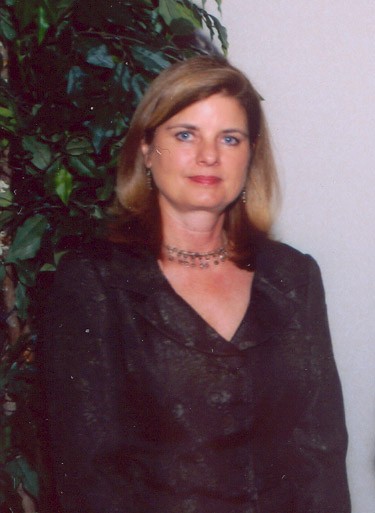 My Turn
My Turn
- Cindy Ragland
For the past six years, I have had the pleasure of doing what I love
best. And that is marketing the Department of Vocational Rehabilitation
and our consumers to the private sector, while looking for the perfect
job match. I love informing employers and the community about the best-kept
employment secret in the area and what we can do for them.
I am a born problem solver and enjoy bringing out the positive abilities of an individual. Matching a DVR consumer with an employer in order to utilize their skills is very exciting. To have a consumer who is down on their luck and think the work world is our of their realm of thinking, is a real challenge for me. I usually find that helping them believe in themselves is 90% of what each one needs.
The social aspect is another wonderful part of my job. As job placement specialist, I attend meetings, sit on boards and committees and learn about the community. Understanding how we are each an integral part of our community is very interesting to me. To be able to convince an employer about their need to partner with us is much easier if our agency is partnering with them. I feel strongly about being active in the community and doing volunteer work. What goes around comes around. It is great to have employers calling me or coming up to me at meetings to say they have an opening or available position. It proves the marketing and exposure to the community has paid off. They understand the benefits of working with DVR and our small role played in the community.
Convincing employers to hire our consumers is not supposed to be a guilt trip or an obligation which can be belittling to our consumer. But truly seeing how a person with a disability can benefit from employment by being a viable contributor to a business and like wise to their community. Nothing builds one's self esteem any better than feeling like you are a part of something. I enjoy immensely being the go between that links our consumer and employer together to make this happen. The economic impact is a sure way to show an employer the importance of taking someone off disability and helping them become a taxpayer. Everyone benefits from this, the consumer, employer, as well as, the community.
While this job can have its disappointments and frustrating days, making the perfect match for a consumer and employer is one of its rewards. I have consumers who have been successfully placed from three and four years ago, who are still in touch with me. How awesome knowing that our agency, working together with the community, can make such a difference.
PERKINS REHABILITATION CENTER IS AWARDED CANDIDATE FOR ACCREDITATION STATUS
The Commission on the Council
on Occupational Education (COE) has awarded Candidate for Accreditation
status to the Carl D. Perkins Comprehensive Rehabilitation Center, located
at Thelma, Kentucky. Mr. Robert
Clark, Commission Chair, following the Commission’s meeting held
in Memphis, Tennessee, on September
21-23, 2003, made announcement of the action.
Candidate for Accreditation is a pre-accreditation status granted to
an institution actively seeking
accreditation by the Commission of the Council. Candidate institutions
must complete a self-study based
on the standards, criteria, and conditions of the Commission and host
a visiting team before it is reviewed
for initial accreditation.
The Perkins Rehabilitation
Center is a state owned and operated facility offering a wide variety
of
rehabilitation services to Kentuckians with disabilities. Among its
many programs, the facility offers a
variety of occupational skill training programs that include Offset
Printing; Materials Management;
Cosmetology; Auto Lube and Detailing; Small Engine Repair; Child Care;
Building Maintenance/Custodial;
and Food Service. The Perkins Center is a division of the Kentucky Department
for Vocational Rehabilitation,
Workforce Development Cabinet.
The Council on Occupational Education, based in Atlanta, Georgia, offers
quality assurance services to
postsecondary workforce education providers across the nation. Organized
as a non-profit corporation, the
mission of the Council is to assure quality and integrity in career
and workforce development. Services
offered include institutional accreditation (recognized by the U.S.
Department of Education), program
quality reviews for states and workforce education providers, and informational
services. Qualified professional volunteers who are experts in workforce
education carry out most of the
Council’s work.
Institutional membership in the Council is voluntary, but can be achieved
only by becoming accredited.
The Council’s current membership makes it unique. Members include
postsecondary public technical
colleges, specialized military and national defense institutions, Job
Corps Centers, private career institutions,
non-profit workforce education providers, corporate and industry education
units, and federal agency
institutions. No other agency accredits and serves the diversity of
organizations served by the Council.
There are approximately 435 institutional members at the present time.
Persons interested in learning more about the Carl D. Perkins Comprehensive
Rehabilitation Center can
call 606.789.1440 or visit the Center’s website at www.cdpcrc.ky.gov
Office of the Month
The Jungle Room
This month’s office of the month goes to Taylor Carter, employment
specialist, Frankfort.
Carter’s Field Administrator Gina Hughes nominated him. Here’s her explanation.
“The King lives on!
He is working for the Department of Vocational Rehabilitation as a Job
Placement
Specialist in Frankfort, Kentucky. He welcomes everyone to stop by and
visit. Tours begin sharply
at 8:00 am and end at 4:00 pm.”
“Thank you, thank you very much.”
Cincinnati Internal
Revenue Service Campus Disability Awareness Month Observance
Northern Kentucky Employment Specialist Cheryl Martinez was one of three
speakers for the Cincinnati
Internal Revenue Service Campus Disability Awareness Month Observance
on Oct 23,2003. Also on the
panel were Dale Williams, EEO Coordinator - IRS, John Kraimer, Disability
Coordinator- Raymond Walters
College( part of the University of Cincinnati) “There were introductions,
a pledge to the flag and then we
were asked questions,” Martinez said. “From the feedback
I have received, it went very well. Martinez also
presented the “Pick a disability” portion of the Windmills
training.
picture
Congratulations
Statewide Council Member Named Executive of the Year
Henderson-Henderson County Chamber of Commerce President George Warren
has received top
recognition from the Kentucky Chamber of Commerce Executives (KCCE)
as the organization's
"Executive of the Year." Warren received the award at KCCE's
Annual Meeting, Oct. 15-16 in Mt. Sterling, Ky.
Warren has been a member of the Statewide Council for Vocational Rehabilitation
for the past three years.
During his tenure with the council, he has served on many committees
including chairperson of the public
awareness committee.
Partners in the news
Northern Kentucky KYBLN kick-off a big success
http://www.kypost.com/2003/10/28/kydisabilities102803.html)
http://www.enquirer.com/editions/2003/11/03/biz_wwwbiz1eckberg.html
Kentucky Agrability
http://www.agrabilityproject.org/newsletter/october_2003/1.cfm
Windmills
http://www.accessiblesociety.org/topics/economics-employment/restrictedaccess.html
Welcome to DVR
Rebecca Roberts, VR Assistant, Frankfort
Sandra Price, LPN, CDPCRC
Roya Hood, Counselor, Richmond
Larry Hayden, Vocational Teacher, CDPCRC
Leake receives recognition for MS partnership
Louisville - On November
11, the Kentucky-Southeast Indiana Chapter of the National Multiple
Sclerosis
Society held its annual meeting to report on the activities and achievements
of fiscal year 2003. As part of
the event, many volunteers and supporters were recognized for their
contributions to the chapter. The group
presented central office administrator Jody Leake with a Millennium
Circle Club award. The award is given to
key volunteers that have helped the society expand their program services.
Leake was selected for the award
for helping the group educate VR Counselors and increase awareness about
MS throughout the state. A
representative of the chapter said they were very excited about the
opportunity to work with DVR and meet
with staff.
Leake says the most rewarding aspect of having worked with the staff
at the MS Society was to watch a
partnership develop between agencies. “Both are the better for
having worked on this training project together
and the ultimate beneficiary will be the consumers we serve,”
Leake said. "The MS Society is more deserving
of recognition for providing our staff with an outstanding training
at no cost to DVR."
History of CDPCRC
Over the last thirty years,
30,000 people with significant disabilities have come through the doors
of the
Carl D. Perkins Comprehensive Rehabilitation Center on their way to
employment and self-sufficiency.
On Friday, September 12, 2003, the Center held a 30th Anniversary Ceremony
commemorating the
accomplishments of the Center’s staff and students throughout
the years. Speakers included two past directors: Caroll Burchett and
Bill Duke; Joyce Bowlin, retired HRD Administrator; Commissioner Bruce
Crump; and current Center Director Barry Newill. Janet Hoover, Communications
Director for the Cabinet for Workforce Development, addressed the audience
of over one hundred on behalf
of Cabinet Secretary Willie Lyle, who was unable to attend.
The speeches included snippets of history ranging from hilarious to
sublime. Stories of mishaps and practical
jokes were intertwined with memories of valued staff such as W.L. Walters
who have since passed on.
Regardless of the speaker, the message was the same: the Center has
and will continue to provide
life-changing services to individuals with disabilities in Eastern Kentucky
and throughout the Commonwealth.
The official ceremony ended with a slide show of the Center past and
present. After much laughter and good
nature kidding about how each had changed, long time employees of the
Center left the room to return to their
work. They were not wearing the platform shoes or bellbottom pants projected
on the screen. Sideburns were
gone, hair had whitened and lines had replaced the smooth tight skin
of youth. Yet, they were easily
recognizable by the way they held their heads high and the look of pride
in their eyes for working in a job that
impacts lives daily - in a place that is committed to doing just that.
Culminating many years of planning and hard work, the Carl D. Perkins
Comprehensive Rehabilitation Center
opened on July 7, 1973, to provide comprehensive medical and vocational
services for Kentucky’s citizens
with severe disabilities. Even from it’s beginning, the Center
has represented the latest and finest in
comprehensive rehabilitation services.
The Center was inspired by four stalwarts in an effort to provide rehabilitation
opportunities for people with
disabilities – the late Corbett Reddy, a former Commissioner of
the Rehabilitation Services Administration ad
Director of Virginia Vocational Rehabilitation; Ben F. Coffman, then
director of the Kentucky Department of
Vocational Rehabilitation; Basil Mullins, Eastern Kentucky Regional
Director of Vocational Rehabilitation;
and Carroll Burchett, the Center’s first director. These four
convinced Governor Louie Nunn, State Secretary
of Education Wendell Butler and State Senator Wendell VanHoose to support
this tremendous effort. However, the Center’s staunchest supporter
was Congressman
Carl D. Perkins, who represented Kentucky’s 7th Congressional
District for 36 years. Congressman
Perkins began to“knock on doors” in Washington, D.C., in
a persistent quest to win support for the Center’s
funding. Congressman Perkins wanted the Center to be located in Kentucky,
but he especially wanted it for
Eastern Kentucky. Fortunately for Kentucky, he was successful in gaining
funding for the facility.
Originally, the Center was named the Eastern Kentucky Comprehensive
Rehabilitation Center and was
located upon land that was made available for purchase by the Paintsville
Development Association in their
effort to obtain jobs for the local area. It was renamed in May 1985
to honor the man who had worked so
diligently to make these critical services a reality for the Commonwealth
of Kentucky. The Center is a
state-operated comprehensive rehabilitation facility and is part of
the Department of Vocational Rehabilitation,
Cabinet for Workforce Development.
In its 30-year history, the Center has made a profound difference in
the lives of more than 30,000 people
with disabilitieswho have taken advantage of education and job training
opportunities.
When the Center opened in 1973, primary programs included: vocational
training, evaluation, medical services and recreation.
Over the years, the Center has undergone many changes to meet the demands
of its customers. Some major
accomplishments have been the establishment of a well-known brain injury
program, assistive technology
services and an outreach program that has allowed the Center to collaborate
with Morehead State University,
Prestonsburg Community College, Mayo Technical College, the Carl D.
Perkins Job Corp Center and many
local school districts and businesses throughout the state. Currently,
the Center offers major programs
in vocational training, assessment, brain injury services, outpatient
rehabilitation
services, assistive technology, rehabilitation engineering services,
a day care center that provides
needed child care services for the area as well as a job training program
to students, and the materials
management training program which prepares our students for jobs in
the warehouse industry. The Center
is currently in theprocess of developing a retail sales and merchandizing
training program and a
hotel /motel cleaning training program. Both training programs are projected
to be operational in fiscal year
2003-04. Recently the Center has added equipment that provides the Center
with a distance learning
capability to reach out to the Department of Vocational Rehabilitation’s
15 district offices. During its 30 year history the Center has added
a gymnasium and a speech and hearing
laboratory.
The Center is accredited by the Commission on Accreditation of Rehabilitation
Facilities (CARF), the
Council on Occupational Education, and as a Comprehensive Outpatient
Rehabilitation Facility (CORF)
by the Kentucky Department of Health. The Center is a member of the
National Consortium of State
Operated Comprehensive Rehabilitation Centers.
The staff of the Carl D. Perkins Comprehensive Rehabilitation Center
is proud of its 30-year history and
looks forward to many more years of meeting the needs of Kentucky’s
citizens with disabilities.
Highlights from the Celebration
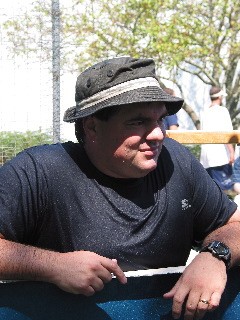
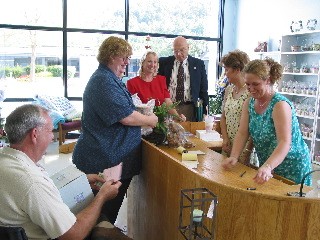
Consumers in the News
The following is an excerpt from the Rotary Club report that appeared
in the
The Glasgow Daily Times on September 24, 2003. David Ritchey is a consumer
of
Scott Bennett in the Glasgow DVR office.
Our speaker last week was
David Ritchey. David works at the YMCA and told the club about a program
he
is under called "Putting People and Solutions to Work." Basically
the program is under the Kentucky
Department of Vocational Rehabilitation and assists individuals with
disabilities to achieve suitable
employment and independence within an assigned area.
The program, Preparing Adults
for Competitive Employment teaches individuals the interview process
and
customer skills needed in the workplace, which allows them to reach
their job goals and be independent.
Each participant serves an internship. When David first started, he
said he might be nervous for two reasons.
First he was not used to
speaking to such a large group and, second, he only received a 24-hour
notice
for his program. Regardless, his presentation did not show his concerns
and went over without a flaw.
David served his internship at the YMCA.
David said that the skills
he learned, like accounting, customer service, and public speaking,
have given him
opportunities and allowed him to meet many people. The program has over
120 instructional hours followed
by an internship.
Originally from Louisville,
after visiting Glasgow, he "fell in love with this community,"
and decided to stay.
We are glad he did.
Goodwill Honors Ashland
DVR field office
Goodwill Industries KYOHVW recently presented the Department of Vocational
Rehabilitation’s (DVR) Ashland field
office with its Partner Award.
Goodwill cited the DVR Ashland office as an outstanding partner for
the office’s “mission to find suitable employment”
for
those with disabilities and for the staff’s teamwork efforts with
Goodwill.
Goodwill Industries also recognized a consumer of the Ashland office.
DVR rehabilitation counselor
Dawn Barker’s consumer was named Goodwill’s 2002 Supported
Employment Employee.
Goodwill Industries of KYOHWV represents the tri-state area of Kentucky,
Ohio and West Virginia.
Changing Attitudes
Windmills training looks to help employers with diversity at work
By Jason Jones
Who is our customer at the
Department of Vocational Rehabilitation (DVR)? Is it the consumer or
the employer? The
fundamental principle of Windmills training is that it is both.
Training veteran and co-author of the “Windmills” program
Richard Pimentel paid a visit to the Bluegrass September 3-4 to ask
a very important question. “Why do we spend so much time and resources
getting our consumers job-ready without teaching employers how to hire
them?” Pimentel said.
In its marketing materials "Windmills" is described as a high-impact,
attitudinal training program developed by the California
Governor’s Committee for Employment of Persons with Disabilities.
The curriculum consists of 11 sections (modules) that
use participation and discovery as learning vehicles. Although recent
federal and some state laws prohibit employment
discrimination against persons with disabilities, attitude often remains
as the most significant barrier to employment. The
"Windmills" curriculum seeks to remedy attitudinal barriers.
Pimentel led a two-day training session geared to teach DVR staff how
to present the Windmills program to Kentucky
employers. Although most of the attendees were getting their first large
dose of the program, it is not new to Kentucky DVR.
Long–time employment specialists like Debbie Chandler and Cheryl
Martinez have been doing the training for employers for
several years now.
Chandler says the training provides a unique connection for rehabilitation
professionals and employers.
“Even though we believe we have a good understanding of disabilities
as rehabilitation professionals, this training helps
enhance what we know and gives us the proper tools for communicating
that knowledge to employers,” Chandler said.
“Windmills gives us an opportunity to break down the attitudinal
barriers which are the greatest impediments for people with
disabilities in finding employment.”
Martinez, who has presented the training for nine years, says that going
through training once again helped fine tune her skills.
“This training brought in current ADA and diversity issue implications.
There is still a tremendous need for attitude awareness
and education as there is a new generation of business leaders, managers
and supervisors. Job retention, underemployment
and advancement opportunities are critical issues along with the initial
hiring of persons with disabilities. The new Windmills
program is poised to do just that."
One major benefit of the training is to provide employment specialists
with an extra incentive to offer employers. The
program was not exclusive to employment specialists. Several counselors,
field administrators and supported employment
specialists took part as well.
Alex Scholtz, employment specialist in Louisville, said that he was
very excited about the potential of the program. “We need to reach
out to our employers and break down some of the misconceptions about
hiring people with disabilities. This program can do that.”
More than 40 staff members went through the two-day event. Commissioner
Bruce Crump reiterated his commitment to
job placement by attending and actively participating in both days of
the program.
The first step in utilizing the information is to have the participants
return to their districts and train their co-workers.
Step two will be presentations to One-Stop Career Centers and eventually
local businesses.
Washington Post
16 Broadway Theaters to Comply With ADA
By VERENA DOBNIK
The Associated Press
NEW YORK - Half the theaters
on Broadway, including some of its most famous
stages, will become fully accessible to disabled people under an agreement
announced Thursday between the landlord and the government.
Work on the 16 landmark theaters
operated by the Shubert Organization is to
be finished by year's end.
The organization has spent
$5 million over several years to improve
wheelchair seating areas, restrooms, entrances, exits, ticket windows,
concession areas and drinking fountains. But legalities formally bringing
the theaters into compliance with the federal Americans with Disabilities
Act were completed only this week.
"This is a great example
of the public and private sectors working together
to remove barriers for all people who desire to enjoy the unique experience
of seeing a Broadway show," Shubert Chairman Gerald Schoenfeld
said.
The agreement was hailed
by Kevin McGuire, a disabilities access consultant
who uses a wheelchair who advised Shubert. Since childhood he's had
to watch
shows from an aisle, on a sloping floor.
"In the dark, people
would sometimes trip over me and I got my load of
popcorn and soda over the years," said McGuire, of Boston.
McGuire demonstrated the
importance of improvements at The Music Box, which
is presenting Tennessee Williams' "Cat on a Hot Tin Roof."
After buying
tickets at the box office - fitted with a pullout box he could reach
- he
wheeled himself to one of six reserved orchestra section spots where
the
once-sloping floor was leveled off to accommodate wheels.
Under ADA regulations, 1
percent of all seats must be set aside for disabled
people, as well as another 1 percent for companions; both the best and
the
least expensive tickets must be available.
Shubert's theaters include
some of Broadway's most famous stages, including
the Shubert on West 44th Street, where a revival of the musical "Gypsy"
is
playing, and the Winter Garden on Broadway, home of "Mamma Mia!".
The new access plans are
spelled out in two consent decrees between the
Shubert Organization and the government that settle civil lawsuits brought
against the organization under the ADA, enacted in 1990.
The newest of the theaters
was built more than 70 years ago, and modifying
them was "an architectural challenge of a very high order,"
U.S. Attorney
James Comey said.
Comey said authorities are
now checking disability access at other Broadway
theaters.
Scholarship to benefit
women with disabilities
The Ethel Louise Armstrong Foundation Scholarship is for any woman with
a physical disability who
is pursuing graduate studies at a university in the United States. They
are especially looking for women
who are involved in the disability community in their local area.
More Information... http://www.ela.org/scholarships/index_scholarships.html
Welcome New Employees of the Department of Vocational Rehabilitation
Melissa Lewis, Counselor
- Kenton County
Kristen Mansfield, Counselor - Florence
Melissa C. Howard, LPN - CDPCRC
Chris Sheetinger, Counselor - Frankfort
Brent Branson, Counselor - Hopkinsville
PERKINS REHABILITATION CENTER IS AWARDED CANDIDATE FOR ACCREDITATION
STATUS
The Commission on the Council
on Occupational Education (COE) has awarded Candidate for Accreditation
status to
the Carl D. Perkins Comprehensive Rehabilitation Center, located at
Thelma, Kentucky. Mr. Robert Clark, Commission
Chair, following the Commission’s meeting held in Memphis, Tennessee,
on September 21-23, 2003, made announcement
of the action.
Candidate for Accreditation is a pre-accreditation status granted to
an institution actively seeking accreditation by the
Commission of the Council. Candidate institutions must complete a self-study
based on the standards, criteria, and conditions
of the Commission and host a visiting team before it is reviewed for
initial accreditation.
The Perkins Rehabilitation Center is a state owned and operated facility
offering a wide variety of rehabilitation services to
Kentuckians with disabilities. Among its many programs, the facility
offers a variety of occupational skill training programs
that include Offset Printing; Materials Management; Cosmetology; Auto
Lube and Detailing; Small Engine Repair; Child Care;
Building Maintenance/Custodial; and Food Service. The Perkins Center
is a division of the Kentucky Department for Vocational Rehabilitation,
Workforce Development Cabinet.
The Council on Occupational Education, based in Atlanta, Georgia, offers
quality assurance services to postsecondary workforce education providers
across the nation. Organized as a non-profit corporation, the mission
of the Council is to assure quality and integrity in career and workforce
development. Services offered include institutional accreditation (recognized
by the U.S. Department of Education), program quality reviews for states
and workforce education providers, and informational services. Qualified
professional volunteers who are experts in workforce education carry
out most of the Council’s work.
Institutional membership in the Council is voluntary, but can be achieved
only by becoming accredited. The Council’s current membership
makes it unique. Members include postsecondary public technical colleges,
specialized military and national defense institutions, Job Corps Centers,
private career institutions, non-profit workforce education providers,
corporate and industry education units, and federal agency institutions.
No other agency accredits and serves the diversity of organizations
served by the Council. There are approximately 435 institutional members
at the present time.
Persons interested in learning more about the Carl D. Perkins Comprehensive
Rehabilitation Center can call 606.789.1440 or visit the Center’s
website at www.cdpcrc.ky.gov
September News
Using Their Noodle
-by Jason Jones
Job Placement Month gives employment specialists a chance
to be creative
July was a special month
for those people in our organization that are the front line warriors
in the battle to
understand the current job market. An already difficult job of assisting
individuals with disabilities in finding
gainful employment has become an even more lofty ambition for employment
specialists with the economy in
a sputter.
Job Placement Month was an
opportunity to sing the praises of the Department of Vocational Rehabilitation’s
employment specialists. It was also an opportunity to say thank you
to countless employers in the state who
work with the department by being open to creative ideas for working
with individuals with disabilities.
Events across the area were very diverse in nature and each gave the
various districts an opportunity to put their own touch on the activities
for the month.
Robin Ritter, who heads up the department’s job placement program,
says the event is crucial for the efforts of our employment specialists.
“This year was so successful because of the creativity and diversity
of events planned by the employment specialists as a way of really touching
our employers. This month significantly affects what we do all year
long. I’m very excited at the results and all the effort that
went into the planning.”
Examples of the success of Job Placement Month are rampant from every
region of the state. They include Paducah, who threw a breakfast and
awards ceremony for the employers in the area. The specialists there
filed the following report of that activity:
“The Department for Vocational Rehabilitation hosted the Paducah
Chamber Business Education Partnership Committee Breakfast in the Paducah
Career Center on August 5, 2003. There were over 60 attendees for the
breakfast. Bread & Bagel Bakery of Bowling Green furnished the food.
There were representatives from Paducah Chamber of Commerce, Friedman
Center, Child Support, West Kentucky Community and Technical College,
West KY Careers (Job Corps), Murray State University, Council for Post
Secondary Education, Paducah Transit Authority, Easter Seals, Hamilton
Ryker, Lynx, Adult Education, Prichard Committee on Higher Education,
University of Kentucky, Social Security, U S Bank, Oscar Cross Boys
& Girls Club, Paducah Parks Service, Project Bookworm, and Housing
Authority of Paducah”
Paducah isn’t alone. The Louisville group offered this: “The
Louisville Job Placement Month activity took place on Thursday, July
31st at National Processing Company (NPC), which employs around 1600-1800
people.
Approximately 20 Vocational Rehabilitation staff listened as Candy Givens
and Colleen Morris with NPC Human Resources gave detailed information
regarding the company. An extensive “question and answer”
session followed. Information regarding departments, position titles
and requirements, shifts, wage scales, testing, educational requirements,
accommodations, drug screens, police records and more were discussed.
After listening to information regarding the company, the group was
given a tour of the facility where they could actually see people working
the positions that were discussed earlier.
Events such as this give Vocational Rehabilitation staff a chance to
get out in the business community and see firsthand some of the employment
opportunities consumers
can access.
The employment specialists in Henderson celebrated job placement month
July 16. They invited the local job placement vendors along with several
local employers. They made certificates for each one attending as a
"thank you" for their hard work on placing consumers with
disabilities or for hiring consumers with disabilities. A luncheon was
held for the group, where they presented the certificates and gave away
some special DVR promotional items. Local media attended and gave the
Henderson group a nice spread in the July 17 edition of the Henderson
Gleaner. The following is a link to that story: http://www.myinky.com/ecp/gleaner_news/article/0,1626,ECP_4476_2114467,00.html
Below is a list of all the other events in the state.
This is all the information that was submitted. If an event in your
area was not included or there is additional information please send
it to jasonp.jones@mail.state.ky.us
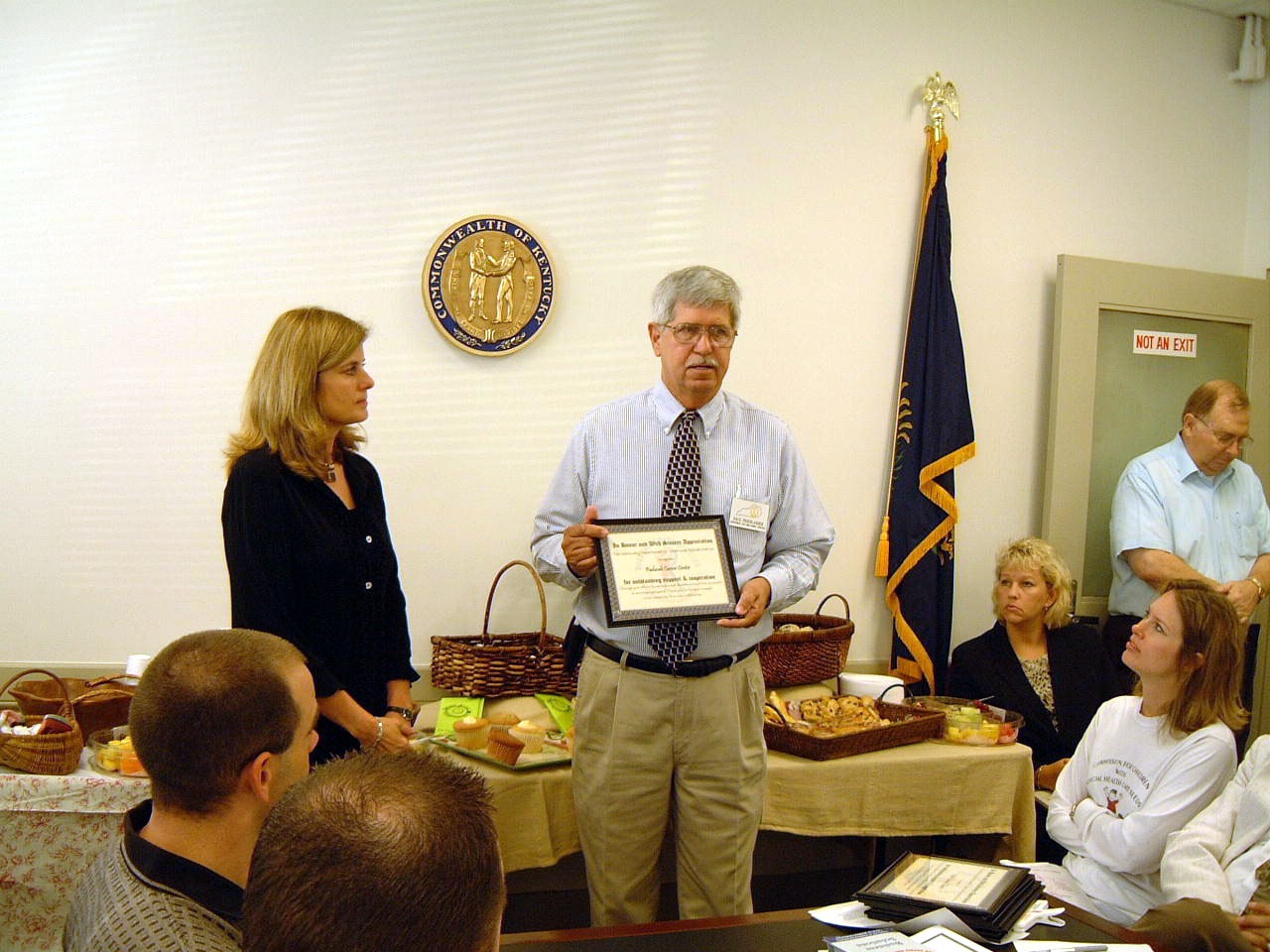
Owensboro had a breakfast open house for job placement vendors.
Lexington is in the process
of requesting a computer scanner and a video camera with a tripod in
order to
serve the needs of their consumers.
The Danville office had a breakfast and small awards ceremony for 10 of the best employers.
The Somerset office attended
and set up an exhibit at the “Building Better Business Forum”
sponsored by the
KSBC- University of KY. They also mailed over one hundred brochures
and thank you notes to all of the
employers they have worked with to date.
West Liberty/Ashland/Morehead
These districts combined efforts this year for a joint meeting on July
11, 2003 at the Paintsville Lake Marina.
Guest speakers and participants provided information and discussed the
future of job development in
Eastern Kentucky. The theme was "Celebrating the Freedom to Work".
The speaker was a local employer
that has worked with DVR for several years, a consumer who is working
at a permanent part-time job, and
State Representative Hubert Collins on the subject of employment in
Eastern KY.
Bowling Green is going to
upgrade the memory on the four computers in their classroom. These computers
are used by consumers for job search and resume development and computer
training.
Elizabethtown hosted a reception/meeting
between job placement staff and managers from Glasgow,
Bowling Green, Bardstown, Shepherdsville, Louisville and Elizabethtown
with the Manpower managers from
the corresponding areas to promote partnerships with DVR.
Madisonville identified six
employers who have made a considerable contribution to the success of
job placements for the consumers in the Madisonville District. They
recognized these employers by giving
them baskets of fruit and cards of appreciation.
Northern Kentucky added support
to several endeavors in the area associated with connecting employers
and consumers of the department. Support included the Northern Kentucky
Human Resources Association
Scholarship Program, Kentucky Business Leadership Network and the Toyota
Opportunity Exchange.
Announcement: CDPCRC
to Celebrate 30 Years
The Carl D. Perkins Rehabilitation Center at Thelma will be “Celebrating
the Past with a Focus on the Future” in honor of its 30 years
of commitment to the community on Friday, September 12. Everyone is
invited to participate in the celebration that begins at 10:00 a.m.
with an open house and tours of the facility, a craft/candle sale and
a formal program at 1:00 p.m. Carnival games for all ages begin at 1:30
p.m.
DVR Shines at “Education
Pays” Ceremony
-By Janet Hoover, Cabinet for Workforce Development
FRANKFORT, KY. (July 14, 2003) - Gov. Paul E. Patton presented Cabinet
for Workforce Development Education Pays Scholarships to 26 Kentuckians
in the Capitol Rotunda today.
The scholarship students are pursuing postsecondary education in Kentucky
in a variety of fields.
The students are enrolled in 15 Kentucky colleges and universities and
represent 20 Kentucky counties. One is an Afghanistan native. They are
preparing for various careers from business to medicine and from forensic
science to theater arts. Their ages range from 18 to 53 years old; their
average age is 30.
The governor congratulated the scholarship winners for continuing their
education.
“From the start of the Patton Administration, we have emphasized
education and have made significant accomplishments in improving the
Commonwealth’s education system,” the governor said.
“Those of you who have made the decision to continue your education
truly personify the value that all Kentuckians must place on education.
You and your family should be very proud of what you have already accomplished
and the new path you’re embarking on to improve your lives and
the lives of others.”
Each of the scholarship winners has used at least one of the Cabinet
for Workforce Development’s employment and training programs and
services. Scholarship applicants were required to write an essay on
“How Education Pays in My Life.” The $500 scholarships may
be used for tuition, books and lab and technology fees.
The following is a list of scholarship winners from DVR and some information
about each.
Michelle Leigh Bishop, 19, of Scottsville is a business management/finance
student at the University of Kentucky. Bishop, a customer of the Department
of Vocational Rehabilitation, was nominated for the scholarship by Jane
Smith of the department’s staff.
Michael Todd Brent, 24, of
Pendleton is a communications student at the University of Kentucky.
Brent, a customer of the Department of Vocational Rehabilitation, was
nominated for the scholarship by Kimberly A. Sheth of the department’s
staff. Sheth received an Education Pays Scholarship
in 1999, the first year of the scholarship program.
Laura M. Byrne, 20, of Ashland
is a pre-med student at the University of Kentucky. Byrne, a customer
of the
Department of Vocational Rehabilitation, was nominated for the scholarship
by Teresa Shortridge of the
department’s staff.
Herbert G. Donovan Jr., 19,
of Burlington is a graphic design student at Gateway Community and Technical
College. Donovan, a customer of the Department of Vocational Rehabilitation,
was nominated for the scholarship by Darene K. Bradford of the department’s
staff.
Kathleen F. Foley, 20, of
Campbellsville is a theater arts student at the University of Louisville.
Foley, a
customer of the Department of Vocational Rehabilitation, was nominated
for the scholarship by Kathy Arnold of the department’s staff.
Sandra Foy, 47, of Elizabethtown
is a student in the University of Louisville’s interpreter training
program. Foy, a customer
of the Department of Vocational Rehabilitation, was nominated for the
scholarship by Nancy Bachuss of the department’s staff.
Anna L. Grout, 21, of Union
is a dietetics/nutrition student at Murray State University. Grout,
a customer of the
Department of Vocational Rehabilitation, was nominated for the scholarship
by Laurie Wilson of the department’s staff.
Nikki King, 20, of Scottsville
is an agriculture education student at Western Kentucky University.
King, a customer
of the Department of Vocational Rehabilitation, was nominated for the
scholarship by Jane Smith of the department’s staff.
Richard W. Metcalf, 50, of
Crestview Hills is an education major at Northern Kentucky University.
Metcalf, a customer
of the Department of Vocational Rehabilitation, was nominated for the
scholarship by Laurie Wilson of the department’s staff.
Sara Mudd, 21, of Louisville
is a history major at the University of Louisville. Mudd, a customer
of the Department of
Vocational Rehabilitation, was nominated for the scholarship by Vickie
Lang of the department’s staff. Mudd also received the scholarship
in 2001 and 2002.
Abdul Jabbar Samad, 27, of
Liberty will be a business major at Prestonsburg Community College this
fall. Samad, a
native of Afghanistan and a customer of the Department of Vocational
Rehabilitation, was nominated for the scholarship by
Kristen Gray Beach of the department’s Perkins Comprehensive Rehabilitation
Center.
June Lynn Saylor, 53, of
Columbia is a Lindsey Wilson College student who is working toward her
master’s degree in
counseling. Saylor, a customer of the Department of Vocational Rehabilitation,
was nominated for the scholarship by Kathy Arnold of the department’s
staff.
Patrick Wayne Stewart, 20,
of Princeton is a music education major at Murray State University.
Stewart, a customer
of the Department of Vocational Rehabilitation, was nominated for the
scholarship by Jan Offutt of the department’s staff.
Betty Michelle Thomas, 20,
of Hopkinsville is a forensic science major at Hopkinsville Community
College.
Thomas, a customer of the Department of Vocational Rehabilitation, was
nominated for the scholarship by Sherry A. West
of the department’s staff.
Stefanie Davis Wood, 32,
of Elkhorn is a social science and secondary education student at Campbellsville
University.
Wood, a customer of the Department of Vocational Rehabilitation, was
nominated for the scholarship by Kathy Arnold of the
department’s staff.
Assessment Training
Big Success
By Jason Jones
The final assessment training
wrapped up on August 15 with the last of the six groups across the state.
Lexington was the
final stop on the tour that made stops in Louisville, Prestonsburg,
Princeton, Maysville and Bowling Green.
Field staff had expressed the need for training in the discipline of
assessment several months ago. A team was formed and the
training was born. The first two days of the training were the same
for everyone. The final day was contoured by local
staff to address issues specific to each region. The plan worked well
according to most staff.
“It was great,” said Louisville counselor Dean Warner. “It
was the best training we’ve ever had, as far as I can remember.”
Allison Jessee, who was involved in the creation and implementation,
says the success was directly related to the hard work of the team.
“The assessment training was a success only because of the huge
efforts the team, presenters,
and staff of the Division of Program Planning & Development made”
Jessee said. “This is the first step in assessment training
and I'm equally excited about the next step.”
Jessee joined Wade Bailey, David Beech and Mark Poston as a presenter
at the trainings. A representative from supported
employment and rehabilitation technology presented during the first
two days of each stop. Don Hiatt and University of
Kentucky Professor Dr. Malachy Bishop shared the platform for the ethics
piece.
The following individuals were involved in the planning, execution and
clerical aspects of the training.
Ivy Alexander
Viva Anderson
JoAnn Barber
Teresa Barney
Ed Bell
Tabitha Burkhart
Michelle Casebolt
Marilyn Chaney
Heather Cole
Tom Combs
Charlie Crigger
Ruth Dyer
Patti Edwards
Susie Edwards
Barney Fleming
Don Hiatt
Larry Hoskins
Carol Isaacs
Pam Jarboe
Paul Jennings
Cheryl King
Karen Lawrence
Jody Leake
Dave Matheis
Dana Mathews
Diane Moler
Jim McDarment
Carleen Morrison
Ernie Pennington
Mark Poston
Jerri Ross
Dawn Rowe
Donna Settle
Dana Short
Doug Wireman
Assessment Training Photos Across the State
 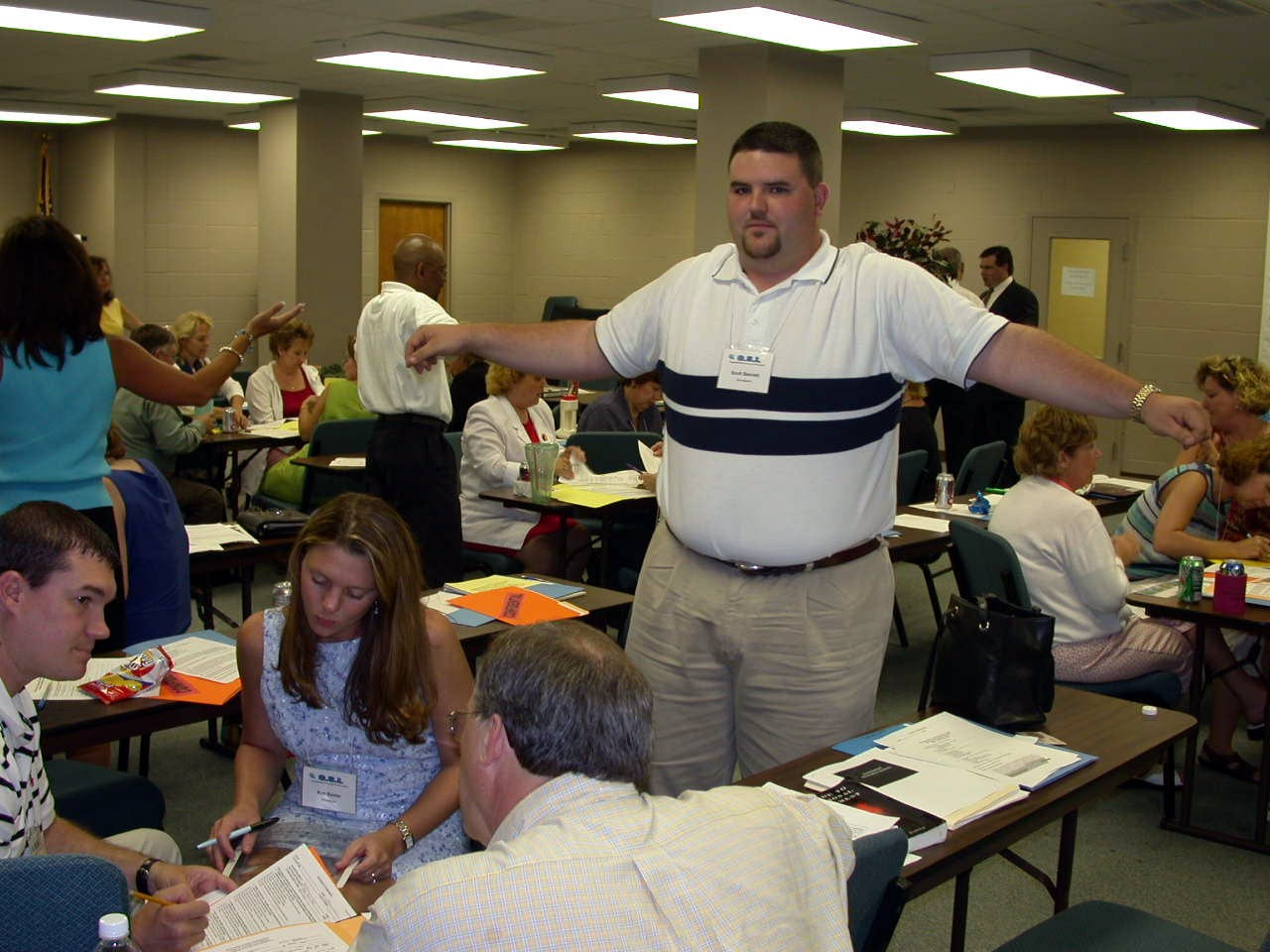 |
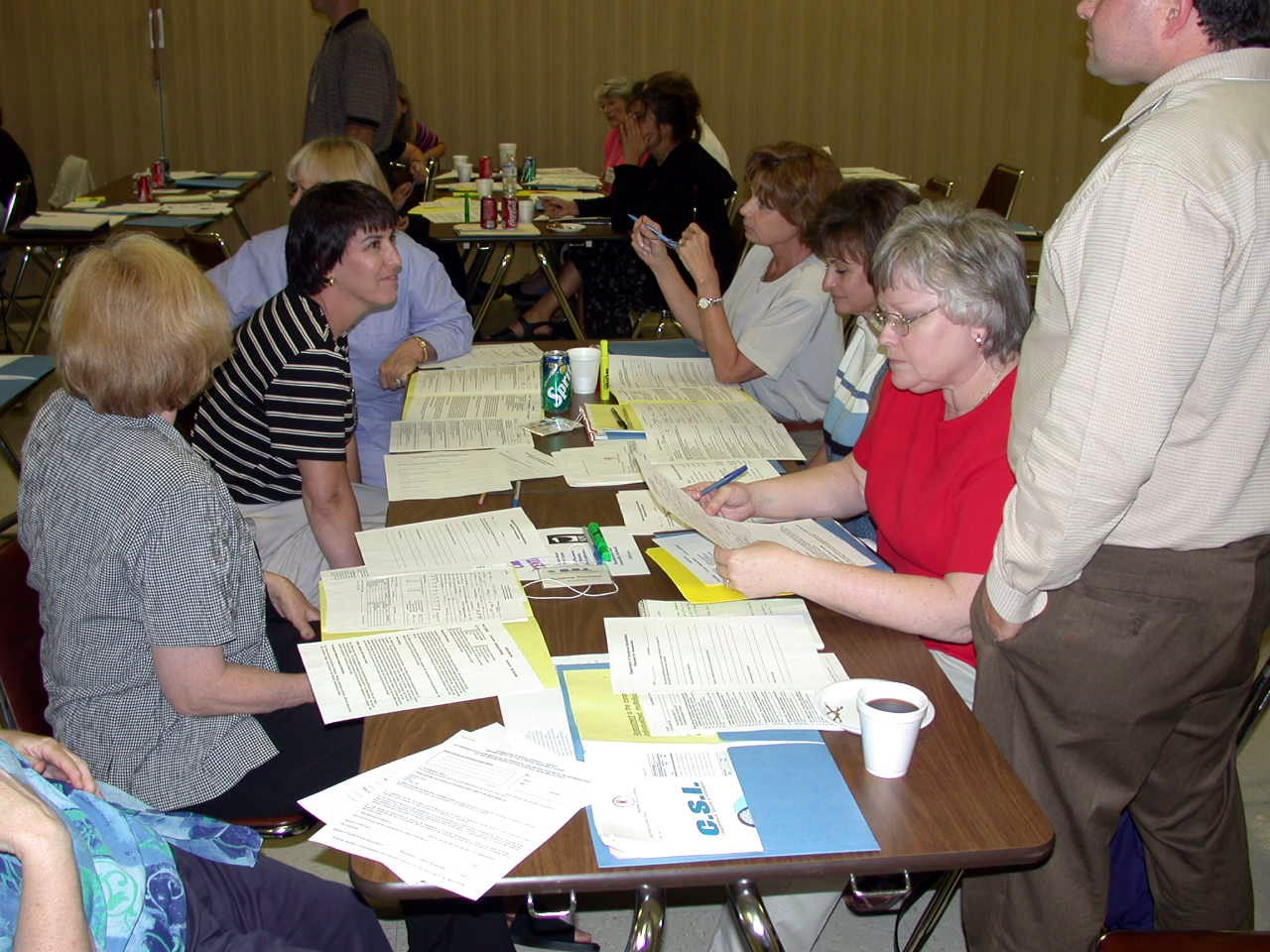
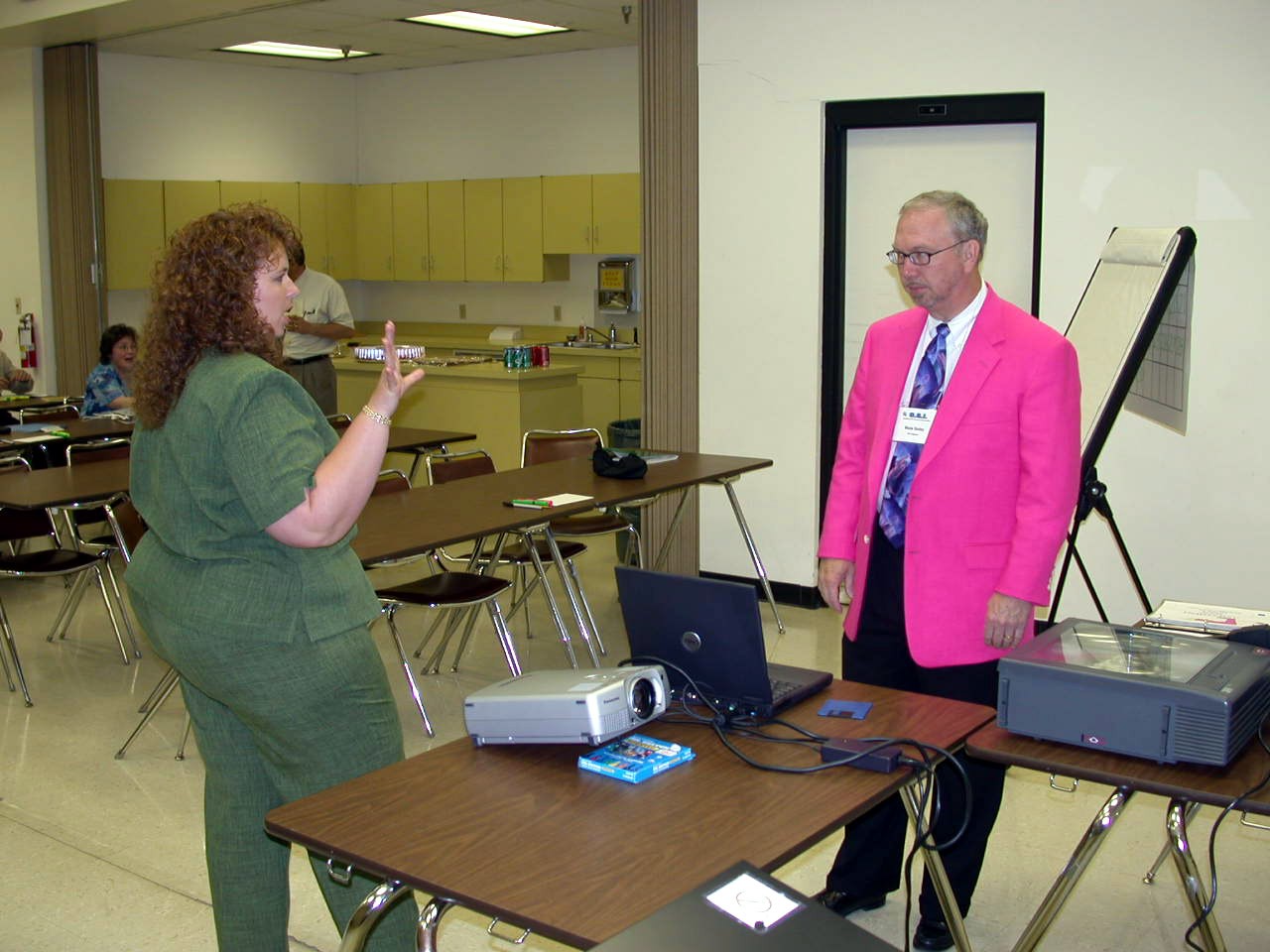
Wells Named Employee
of the Month at CDPCRC
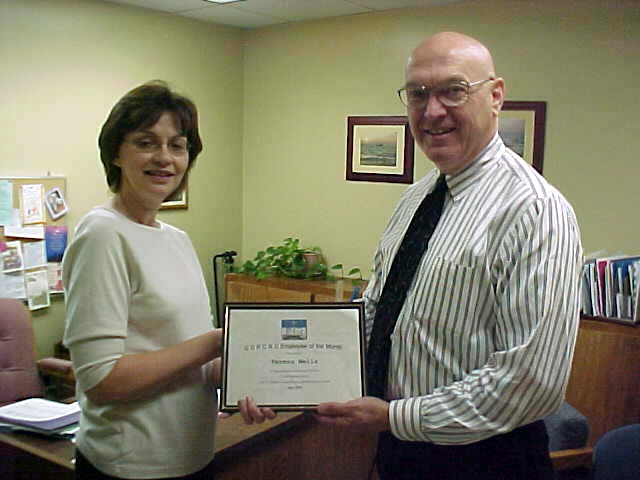
The selection for the CDPCRC "Employee of the Month" for July
2003, was Teresa Wells. Teresa is an Assessor/Advisor for the External
Diploma Program (EDP). EDP is one of the educational programs offered
at the Perkins Center. Teresa provides assessment services and develops
learning recommendations for individuals 25 years of age or older who
want to obtain a high school diploma. After completing the program's
requirements, a diploma is issued through the Paintsville Independent
School system located in nearby Paintsville, Kentucky. Teresa joins
other CDPCRC recipients as "Employee of the Month" which includes:
Dana Short, March
Charlie Coffield, April
Betty Price, May
Steve Favinger, June
Location, Location, Location
Louisville Boasts Expanded Resource Centers for Consumers – by
Debbie Chandler
We hear quite often how critical
location is to the success of an operation. So the Louisville Vocational
Rehabilitation
Job Placement Team has expanded its job placement assistance resource
labs for consumers. Consumers can now visit one
of our four Resource Labs at various locations – thus providing
easier access from a consumer’s home or workplace.
The four Resource Labs can be accessed on a weekly basis for three hours in the mornings at the following locations:
Monday: Chestnut Resource
Lab
Tuesday: Deaf Resource Lab at Chestnut
Tuesday: Middletown Resource Lab
Wednesday: Dixie Resource Lab
For some time now, the Job
Placement Team has engaged in active job search with consumers via the
Resource Labs.
Consumers drop by to view new job listings, search the web, update their
resumes, fax their resumes to employers, and
look at other job opportunity resources available to them.
We are pleased to announce
that the Dixie Resource Lab became operational on
May 7th. This fourth resource lab location provides yet another avenue
for vocational rehabilitation consumers referred
by the Job Placement Team to obtain assistance in their job search.
Mary Beth Schoen and Maite
Somers, assistants in the Dixie DVR office, are lending their talents
in this new lab while
learning additional skills that will prove beneficial to consumers.
Valerie Manley, the Job Placement Team member housed at
the Dixie Office, appreciates all of their help.
In addition to sharing her
expertise with consumers at the Chestnut Resource Lab, Sue Weese recently
began working
directly with consumers via a caseload. Her skills are very much appreciated.
Pat Grant, an assistant in
the Middletown DVR office, has agreed to lend her talents in support
of the Middletown Resource
Lab. Debbie Chandler and Dean Warner welcome Pat’s help.
Ron Jackson is now working
with deaf consumers in our Deaf Resource Lab at the Chestnut DVR office.
The Job Placement
Team values Ron’s talents in this area.
The next time
you’re in Louisville, please drop by during our “open hours”
and visit us
at one of our Resource Lab locations!
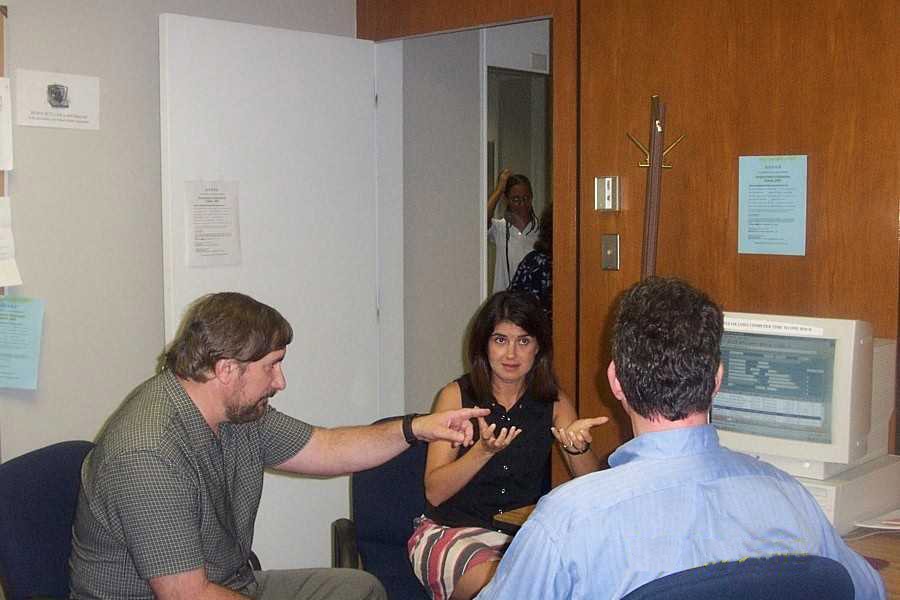
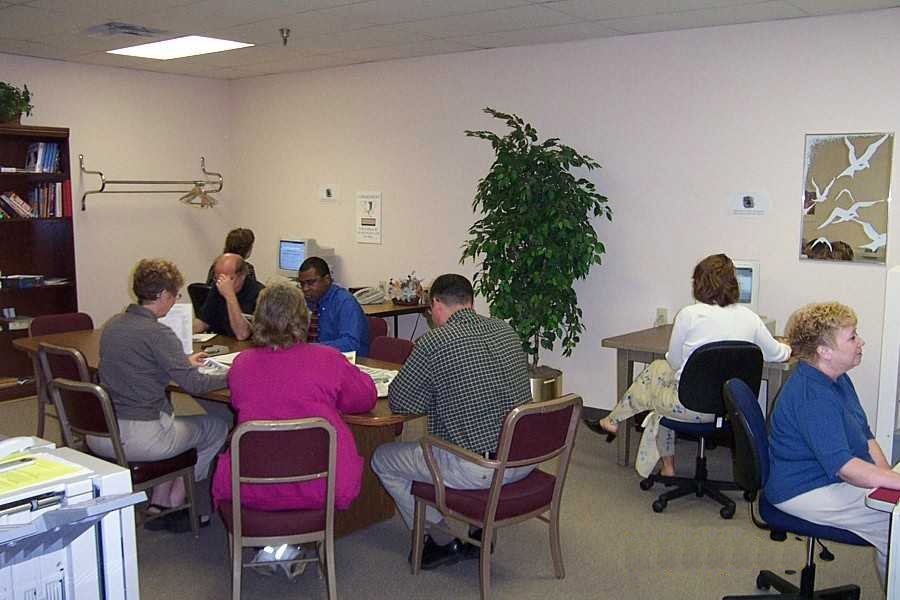
New Team Members
DVR welcomes the following new employee:
Mabeth Kirkpatrick, procedures development coordinator, Central Office
Kim Stacy, employment specialist, Richmond
Paula Ferrell, interpreter, CDPCRC
Kevin Kloubec, counselor, Elizabethtown
Jonathan White, counselor, Lexington
Jamie Yarber, counselor, Lexington
Donald Weinstein, One-Stop specialist, Danville
Elizabeth Harper, counselor, Frankfort
Carolyn Palmer, administrative assistant, Somerset
Julia Cochran, assistant, Morehead
Debbie Roberts, assistant, Elizabethtown
Tony Gilkey, counselor, Lexington
May News
Businesses Can "Do Good" and "Do Well" Through
Tax Breaks Offered To Companies That Hire People With Disabilities
WASHINGTON -- Secretary of
Labor Elaine L. Chao and her Office of Disability Employment Policy
(ODEP) today reminded businesses that they can "do well" and
"do good" by taking advantage of tax breaks offered to companies
that hire people with disabilities.
"We want businesses to know that there are large numbers of skilled
people with disabilities who have the qualifications they seek,"
said Chao. "By hiring people with disabilities, businesses can
also take advantage of a variety of tax benefits offered by the federal
government. So, during this tax season, businesses have a chance to
both `do well' and 'do good.'"
Explanations of the tax benefits can be found in the Frequently Asked
Questions section on ODEP's website at www.dol.gov/odep. They include
the Work Opportunity Tax Credit, which allows employers tax credits
of up to $2,400 for hiring people with disabilities; the Small Business
Tax Credit: IRS Code Section 44, Disabled Access Credit, which helps
small businesses cover the cost of making their businesses accessible,
up to a maximum benefit of $5,000; and, the Architectural/ Transportation
Tax Deduction: IRS Code Section 190, Barrier Removal, which allows businesses
an annual deduction of up to $15,000 for expenses incurred to remove
physical, structural, and transportation barriers for persons with disabilities
at the workplace.
ODEP Assistant Secretary Roy Grizzard said it was important for businesses
to take advantage of tax benefits that are not generally known or utilized
in the business community. "According to a recent General Accounting
Office report, a very small portion of either corporate taxpayers, or
individual taxpayers with a business affiliation, use the tax credits
to encourage the hiring, retention, and accommodation of workers with
disabilities," Dr. Grizzard said. "ODEP is beginning an aggressive
campaign to make companies more knowledgeable about these tax breaks
by publicizing the information on its Web site and including it in meetings
and listening sessions ODEP is having with a variety of its stakeholder
groups."
ODEP also offers employers a variety of methods to help find and hire
people with disabilities. These include the Job Accommodation Network
(JAN), a toll-free information and referral service on job accommodations
for people with disabilities located at 1-800-526-7234 or at www.jan.wvu.edu,
and the Employer Assistance Referral Network (EARN), a national toll-free
telephone and electronic information referral service designed to assist
employers in locating and recruiting qualified workers with disabilities.
EARN can be reached at 1-866-Earn Now (1-866-327-6669) or via its Website
(www.earnworks.com).
ODEP also encourages employers and employees to access www.DisabilityInfo.gov,
a cross-government portal on disability easily accessible to all Americans.
Secretary Rose Steps
Down from Cabinet’s Highest Position; Lile Takes Over
By Janet Hoover
Secretary Allen D. Rose announced
that he plans to leave the Cabinet for Workforce Development at the
end of May for a job opportunity in postsecondary education.
“This is an opportunity that will allow me to still be involved
in technical education, adult education and training and employment,”
he said, “and it is an opportunity I can’t pass up.”
Rose has served five years as cabinet secretary and one year as deputy
secretary. During his tenure, records were set in adult education participation,
GED attainment and technical school enrollment; Kentucky was an early
implementer of the federal Workforce Investment Act; the One-Stop Career
Center system greatly expanded; the cabinet received federal incentive
funding based on performance three years in a row; the Kentucky Workforce
Investment Board was formed; DVR and DFB were recognized as fifth in
the nation; EKOS and KEWES were developed and implemented; and the cabinet
implemented a wide-ranging redesign to improve dozens of processes.
Rose also announced that Willie Lile would become cabinet secretary
effective June 1. Lile is currently executive director of the cabinet’s
Office of Quality and Human Resources, a position she has held since
October 2001.
Lile, who began her state government career in 1979, has in-depth experience
in personnel, fiscal and facilities management in the Labor and Finance
and Administration cabinets. She served seven years as deputy commissioner
of the Department of Workers Claims and four years as executive director
of the department’s Office of Administrative Services.
In 1982, Lile earned a master’s degree in public affairs from
Kentucky State University. She earned a bachelor’s degree in 1978
from Eastern Kentucky University, where she had a double major in psychology
and sociology and a double minor in education and political science.
“ I am very excited and proud to be a part of the Cabinet for
Workforce Development,” Lile said. “I am honored to have
been selected as the new cabinet secretary and will strive to maintain
the excellence for which this cabinet is so well known.”
April News
Commissioner Crump declares
April 9 Red, White & Blue Day
 |
Recently Secretary Rose sent
out a message encouraging all Cabinet for Workforce Development employees
to send names and pictures of loved ones that are serving in the military
during this time of conflict. The list is growing from those who have
family, relatives, and friends who are serving this country.
There are several people within the Vocational Rehabilitation family that
are performing active duty in the military at this time. I am requesting
that you send the names and addresses of those individuals to Jason Jones,
who will share those names with staff who would like to send items or
include them in their prayers. The American Legion Post 7 in Frankfort
will send packages to troops, free of charge, if the sender is a family
member or a close associate. The package must include the service person’s
name and mailing address.
I have had several people from the Department ask me what can we do to
support our troops and the families of those who are awaiting the return
of their loved ones. I am requesting that all staff, who wish to participate
in this Special Day of Recognition, wear Red, White, and Blue to work
on Wednesday, April 9, 2003 in support of our troops and their families.
I know our staff, who have loved ones in the military, will be appreciative
of our efforts to show support.
I will continue to keep those serving this country and their families
in my prayers and hope you will do the same. I am thankful for this opportunity
to work with so many wonderful people within this Department and the Cabinet.
Thank you for your time and consideration of this request.
Commissioner Bruce Crump
Honorning DVR Employees and Family Members
in the U.S. Millitary
New Web Site to Gather Comments about Disability
Research Needs
A new Web site has been developed
by the government's Interagency Committee on Disability Research (ICDR)
to gather comments and recommendations on research needs for Americans
with disabilities, the U.S. Department of Education announced today.
The committee, chaired by Steven James Tingus, director of the Education
Department's National Institute on Disability and Rehabilitation Research
(NIDRR), produced the site to help ensure that federal research efforts
meet the needs of the disability community. The site can be found at http://www.icdr.us/.
"We want to make it easier for individuals with disabilities, their
family members and other stakeholders to let us know what research issues
we should consider," Tingus said. "We will use this feedback
to generate recommendations on research and development that will improve
the lives of people with disabilities."
Upon opening the home page, the reader sees in bold letters, "Send
your comments to the ICDR."
Clicking that link takes the reader to a comment form where individuals
may offer their ideas about access to technology, education, employment,
community life, health care and other needs.
Other links on the page cover topics such as:
· *President Bush's New Freedom Initiative to help people with
disabilities;
· *The ICDR statutory authority and mission;
·*Membership of the committee; and
·* Links to other disability sites.
"Coordinated research among federal agencies is an essential part
of creating barrier-free living for people with disabilities. This is
a significant part of President Bush's New Freedom Initiative," said
Robert H. Pasternack, assistant secretary for special education and rehabilitative
services. "That is ICDR's mission.
"This Web site allows all Americans interested in these important
issues to provide input on potential areas of needed research in areas
affecting Americans with disabilities," Pasternack said.
The ICDR Web site will serve as a catalyst for information sharing and
be a source for recommendations to the president and Congress on policy
and priorities related to disability and rehabilitation research.
The site will also increase awareness of federal disability research activities
and make new research outcomes more available to the public. Congress
recognized the importance of coordination among federal agencies in the
area of disability and rehabilitation research by establishing the ICDR
in the Rehabilitation Act of 1973.
| |
|
| |